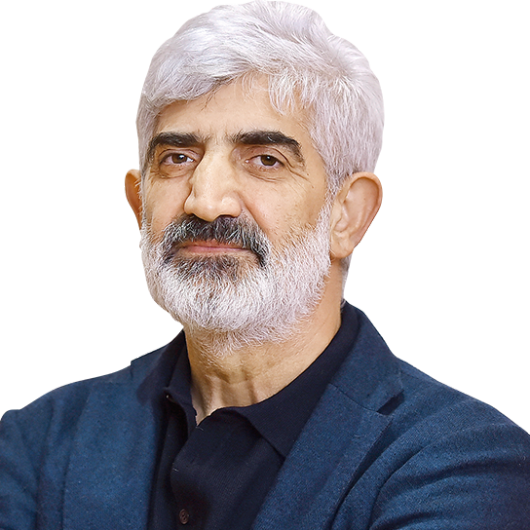
- 29.01.2025, Wednesday
- 01:32
Shaping the Future of Migration and Asylum Policies in Türkiye
23:4214/11/2024, Thursday
Next article
İhsan Aktaş

As a nation with an intense agenda, Türkiye often has to address issues in a single year that European countries may take a decade to resolve. This fast-paced approach isn’t limited to migration and asylum policies; similar pressures apply across many areas. For example, issues like the geopolitics of the Caucasus, the Syrian civil war, the Cyprus and Greece disputes, Libya and the Eastern Mediterranean, the Palestinian occupation and Israel conflict, combating terrorism and the PKK, relations with
As a nation with an intense agenda, Türkiye often has to address issues in a single year that European countries may take a decade to resolve. This fast-paced approach isn’t limited to migration and asylum policies; similar pressures apply across many areas. For example, issues like the geopolitics of the Caucasus, the Syrian civil war, the Cyprus and Greece disputes, Libya and the Eastern Mediterranean, the Palestinian occupation and Israel conflict, combating terrorism and the PKK, relations with the US and the European Union, and strengthening the Organization of Turkic States are all on Türkiye’s agenda. These are topics substantial enough to occupy a single country for decades.
I believe that Türkiye should approach these matters with an inclusive perspective aligned with its historical mission rather than a rigid nation-state paradigm. This should not be reduced to a discussion of neo-Ottomanism. The Turkish public has no issue with the republic or democracy; in fact, the AK Party has democratized the republic and raised it to European standards.
Today, Türkiye’s growth and development are closely watched around the world. Our president’s strong representation of this mission and his challenge to the unjust system established by the Western world has generated particular interest in Türkiye. Many nations that respect Türkiye are not themselves Turkish, but the West’s historic association of “Turkish” with “Islam” in its treatment of the Muslim world over centuries roots this perception. The Ottoman Empire, as the single leader of Muslims, fostered a culture that embraced different nations and religions within a vast imperial framework.
The high culture of the Ottoman Empire is still remembered with respect across regions from the Balkans to Cairo, and from Arab countries to Africa. Even a prominent nation-state like Britain continues to engage with diverse nations, preserving its interests through policies influenced by its colonial past.
**Migration and Refugees in Türkiye**
Extensive research has been conducted on migrants and refugees in Türkiye, and one of the first studies addressing widespread misconceptions in public opinion was prepared by us. We have attended workshops on this topic with AK Party officials. Türkiye, as a country with deep traditions, occasionally takes varied stances on the matter, yet ultimately achieves a rational footing.
We recognize the heavy burden of the migrant and refugee population. The government must keep this issue a priority, especially outside election periods, and share practical roadmaps with the public. The opposition’s habit of raising the issue only around elections without follow-through does not help resolve it, so a more proactive government stance is necessary.
**Recommendations from the Migration and Diaspora Foundation Report**
Today, I attended the presentation of the Migration and Diaspora Foundation's report, “Türkiye’s Migrant Movements.” Two key recommendations from the report, presented by Foundation President Recep Seyyar, stood out:
1. **Accelerating Work Permits:** As Interior Minister Ali Yerlikaya and Labor Minister Vedat Işıkhan have also noted, it is critical to expedite work permits for refugees employed in vital sectors. This would bring hundreds of thousands of workers under tax obligations, preventing exploitation of both the state and the workers.
2. **Determining the Status of Young Migrants:** The report emphasizes the need to address the status of young people who were born in Türkiye and completed their education here, either through citizenship or adjusted migrant status post-graduation. Instead of sending hundreds of thousands of educated young people to Europe, it would be more rational to harness their potential for Türkiye’s development.
**A More Equitable System is Possible**
Türkiye must consider migration and integration policies with economic factors in mind. Western countries tend to attract only the most skilled individuals. Türkiye, by combining its own expertise with the experiences of Western states and Pakistan during the Afghanistan conflict, has the potential to establish a more just system.
#Migrants
#Refugees
#Migration
#System
#Türkiye
#West
LEGAL NOTICE
The BIST name and logo are protected under the "Protected Trademark Certificate" and cannot be used, quoted, or altered without permission.All rights to the information disclosed under the BIST name are entirely owned by BIST and cannot be republished. Market data is provided by iDealdata Financial Technologies Inc. BIST stock data is delayed by 15 minutes.
